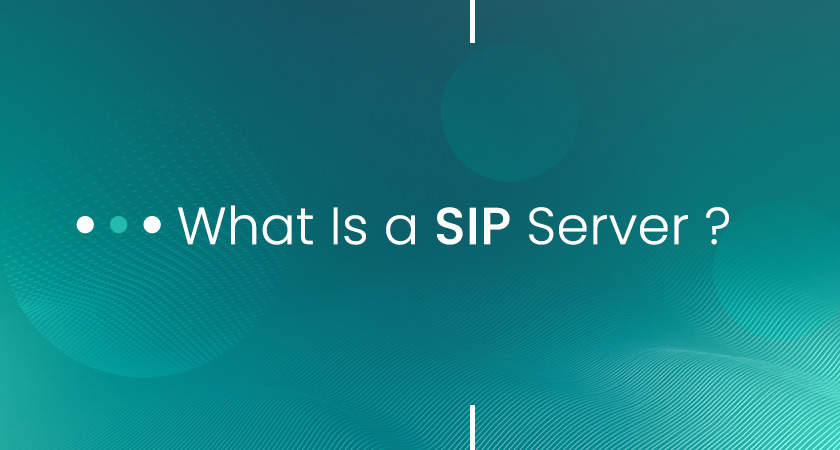Today, most VoIP-based telecommunication networks use SIP servers for call routing. This article aims to explain how an SIP server works and its importance for any organization seeking an IP PBX or VoIP system.
What is the SIP Protocol?
SIP (Session Initiation Protocol) is a signaling protocol responsible for creating, configuring, and terminating sessions between two endpoints on a network. Essentially, SIP was created to support voice and video calls over IP networks between two endpoints. It can also be used for instant messaging and file transfers.
The RFC 2543 standard, which defines the SIP protocol, was published in 1999 by the Internet Engineering Task Force (IETF). Over time, it was developed to become a suitable alternative to H.323, addressing its limitations. Some advantages of RFC 2543 over H.323 include:
- Better communication capabilities and support for unicast and multicast transmission
- Simplified design due to fewer functions in each node
- Support for voice and video calls
- Expanded and broader capabilities
Although RFC 2543 has since been replaced by newer versions, it remains prevalent because many standards are still based on it.
What is the Difference Between VoIP and SIP?
VoIP is a technology for transmitting voice over IP or Internet Protocol, while SIP is a standard protocol that enables VoIP communication between devices. Additionally, SIP increases the flexibility of communication systems, allowing interaction with other protocols. Many SIP trunking providers may also offer VoIP and UCaaS (Unified Communications as a Service).
What is an SIP Server?
One of the essential components of any PBX system is the SIP server, which manages the protocol and routing of all SIP calls on a network. Designed to facilitate communication between multiple users regardless of their location, SIP servers can initiate, manage, or terminate phone calls in response to requests from other devices. Other functions include call signaling (such as dialing), call setup, and user authentication management.
You can deploy an SIP server in two ways:
- Through a telecommunications company as a hosted service
- As a hardware-based setup within the organization’s internal network
Today, there are many cloud-based services abroad, and recently there are companies in Iran that offer Hosted PBX solutions without the need to purchase or maintain physical equipment at your business location.
How Does an SIP Server Work?
An SIP server can be considered a hub that manages call transmission and termination through two types of SIP proxy servers: stateless and stateful. The primary difference between them is that a stateless proxy server does not store any session information, whereas a stateful proxy server does.

Stateless SIP Proxy Server
This proxy server does not store call information and is typically used for troubleshooting and managing connections. Because no information storage is needed, stateless proxies operate with minimal memory and CPU, allowing for greater scalability in load balancing and faster response times for requests, as they don’t require processing time.
Stateful SIP Proxy Server
This proxy server retains all information related to each call. If there is a connection issue, call logs can be accessed. Moreover, if a SIP user agent accidentally disconnects, it can re-establish communication with the other endpoint without starting a new session, saving bandwidth and time for both parties, as there’s no delay in establishing new connections.
The downside is that stateful SIP proxies have a higher overhead compared to stateless proxies and require more resources to store data.
Benefits of an SIP Server
The benefits of an SIP server include reduced bandwidth costs, improved call management, lower latency, enhanced dialing efficiency, and better performance through load balancing.
As a result, businesses can reduce the number of phone lines they need, enjoy more flexibility across various devices for communication and security, and achieve significant cost savings.
Network Security with SIP Servers
An SIP server secures the network by verifying user identities before sending or receiving data packets. An SIP server also requires Message Digest (MD) authentication.
Message Digest authentication provides identity verification before session keys are exchanged using HMAC-MD5 as the algorithm. This approach encrypts the message digest using a shared secret key, which only the intended recipient can decrypt with the same key. The main advantage of this protocol is its ability to offer integrity and authentication services without sending passwords through insecure channels or storing them on devices.
What is the Difference Between an SIP Server and SIP Trunk?
Both SIP servers and SIP trunks use SIP protocols, but they are distinct terms. Generally, an SIP server is part of the network that facilitates Internet-based phone calls for businesses. In contrast, an SIP trunk is a phone service that connects an organization’s IP PBX to an Internet Telephony Service Provider (ITSP).
Simply put, an SIP trunk is the virtual version of traditional analog phone lines, primarily replacing legacy PBX systems in organizational environments. In SIP trunking, the routing of calls is handed over to the internet service provider instead of traditional PSTN lines.
Conclusion
SIP is a highly valuable and efficient protocol that brings numerous advantages for businesses. SIP is mainly used today in VoIP technology to set up and manage calls. SIP servers can be used for video conferencing, instant messaging, call transfer, and audio and video services, among other applications.







